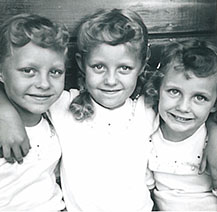
Vivian, Wanda, and Lenora Warkentin
The Talented Warkentin Sisters
by Alex Walsh
The Warkentin sisters, Lenora, Vivian, and Wanda, have been making music in the Bay Area since 1970. Over the years they have performed many concerts, together and apart, in various ensembles and orchestras. Proud members of the Freeway Philharmonic, they continue to thrive in the local music scene.
EARLY YEARS
The Warkentin sisters grew up in a Mennonite community in Reedley, CA, south of Fresno. Twins Vivian and Wanda were born in 1950. Lenora was born in 1951 and their brother, Kenny, born with Down syndrome, arrived a few years later.
The Warkentins came from a long line of farmers. Their grandfather grew peaches and their father had a dairy farm. As children the sisters loved to visit their grandparents where they spent many hours playing in the orchards. When they got older they worked in the peach packing shed to make money for college.
“Our grandfather had a peach farm and he had a packing shed. The peaches would go by and you’d pick the right size for the box. You start in the back for the little ones, about 40 peaches per box. When you’re at the top of the line you pick the big peaches. Sometimes they were so big you’d only get five per box.” — Vivian Warkentin
Music was an integral part of the Warkentin family. In his off hours their grandfather played the fiddle in an old-timey band with a few of his relatives. Their mother played piano and their father and uncle sang in church. Their aunt also played piano, everything from Beethoven to Boogie-Woogie, and taught the girls how to sing in three-part harmony, which was a big hit at community events.
The girls listened to their family record player and loved mimicking the orchestra as they danced around the room. When they reached fourth grade, Vivian and Wanda were very excited to finally play real instruments.
Vivian: “I really wanted to play the violin. Our mom played the Swan Lake Ballet for us all the time and I would always mimic playing the violin. So I was adamant, I was going to play the violin.”
Wanda: “When we went to get our instruments we were both very thrilled. I said, ‘I guess I want to play violin too.’ Our teacher, Mr. Bauernschmidt, looked at me and said, ‘You really look like a cellist.’ I was so flattered by that. I thought it was wonderful.”
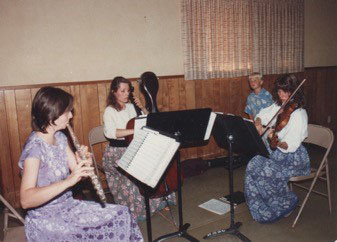
Playing at a family event in the mid-80s
Vivian: “It was really smart of him because he knew we were twins and it would be a good idea if we played different instruments.”
Wanda: “And he needed a cellist.”
The following year, Lenora couldn’t wait to get her instrument: “I wanted to play clarinet but my orthodontist said no, so I played the flute. Right away the flute was it.”
Impressed by the talented Warkentin Sisters, Mr. Bauernschmidt convinced their parents that they needed private lessons. Their mother was delighted and became their greatest cheerleader, taking the girls to their lessons and as many performances as she could.
When the sisters reached 8th and 9th grades, their father decided to buy a dairy farm in Los Angeles with his brother, so the family moved to El Monte, and then San Marino, CA. Coming from the country, suburban life was a shock for the sisters. Their old teacher, Mr. Bauernschmidt recommended that Vivian and Wanda study with Alice and Eleanor Schoenfeld. The Schoenfeld sisters taught at USC. Though they both felt they were in over their heads, they were soon performing in youth orchestras and being exposed to many great musicians. Meanwhile, Lenora was taking private lessons, playing in the band and musical productions in her high school.
After a couple years their father’s dairy farm went bust and the family moved back to Reedley where they were reunited with Mr. Bauernschmidt, who also taught high school in the district. The girls played many concerts together. After graduation Vivian went to UC Santa Barbara on a scholarship and Wanda stayed home to figure out what she wanted to do. Lenora, now a senior, played in the school band and continued her private lessons.
VIVIAN
“When Wanda and I studied with the Schoenfeld sisters they gave us many opportunities, but we both felt out of place, like we weren’t ready. I remember my teacher put me high up in the first violin section and I thought, ‘No, I’m an imposter!’ I felt a lot of tension in my playing and I didn’t feel like my teachers addressed that. With a great player, it’s not hard for them. They’ve found the easy way to play. I didn’t know that. I thought it was a struggle for everybody.”
Vivian’s struggles continued in college. She received a scholarship to UC Santa Barbara but left after one year. Santa Barbara was known as a party school and this was Vivian’s first time away from home so she didn’t take school very seriously. “At home we never even asked to go to dances or the movies. Going to college was like, ‘Wow, freedom!’ I just wanted to get away so badly and have a good time. But then I really soured on that and said, ‘Hey, I want to be a violinist.’ Vivian stayed home the following year and studied with a teacher who recomended her for the Fresno Opera and show band jobs in Reno and Lake Tahoe.
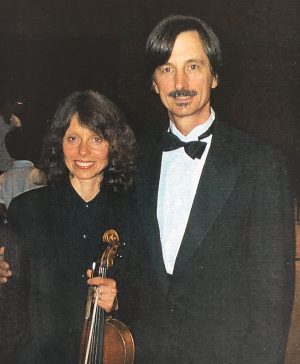
Vivian and her husband, bassist Pat McCarthy. They met while playing in the Oakland Symphony
“I did the Burt Bacharach show for two weeks in Lake Tahoe. They flew us up on a plane and paid for our hotel. All the musicians became friends and it was great. We did two shows a night. The second show started at midnight which I didn’t like because I hated staying up late. I did a lot of jobs like that. Petula Clark, the Carpenters, Wayne Newton, Sammy Davis Jr.—it was fun.”
Vivian was accepted into the San Francisco Conservatory of Music which she paid for with help from her parents and money she saved from her work as a musician. She moved to San Francisco and started school but found herself hanging out in the East Bay most of the time with her sister Wanda, who was now attending UC Berkeley. After a year at the conservatory she became disillusioned with school, dropped out and moved to Berkeley where she lived with her boyfriend. She played with the UC Berkeley Orchestra and did various church gigs to make a living. Eventually, her teacher in Fresno encouraged Vivian to go to Cal State Fullerton to study with Ken Goldsmith. She moved to LA with her boyfriend and went to school on a scholarship. Again, after a year, she dropped out and decided to move back to Berkeley.
“Every time I quit I felt like, ‘There’s something I don’t like about this. Do I need this? What good is this doing me?’ People now would think that’s a waste. But it didn’t cost nearly as much to do these things. Now you have to make really big commitments. There are so many young people going to school and getting into debt. It was a better world back then in that regard, more relaxed. You didn’t have to take yourself so seriously.”
Back in Berkeley Vivian freelanced and joined the Promenade Orchestra, the precursor to the Berkeley Symphony. In 1975 she won an audition for the Oakland Symphony. “I felt so great about that. I couldn’t believe it. Every time I won something I felt like it was a miracle.”
In 1977, Vivian met her husband, Pat McCarthy, a bassist and Local 6 member, while playing in the Oakland Symphony. “He was on the other side of the orchestra and we caught each other’s eye. We were married in 1981. I did not know he was a twin until we were already going out, and he didn’t know I was either. We had a lot in common because of that.”
WANDA
“When our family moved back to Reedley from LA, it was nice. We felt embraced by the people we knew. Mr. Bauernschmidt was there and he really encouraged us. The three of us, Vivian, Lenora, and I, played concerts together. I went to the honor orchestra in Fresno. After high school I took a year off and worked for my grandfather.”
In 1969, Wanda enrolled at UC Berkeley. She played in the orchestra but wasn’t a music major. After two years she decided to get serious about music and began studying with Paul Tobias, a star student of renowned cellist, Margaret Rowell. “She was kind of the gande damme of the cello. She was ill at the time, and when she got better I studied with her too. She was very inspirational but I didn’t feel like I had the fundamentals. I could hardly read music at the time and I don’t think people knew that.”
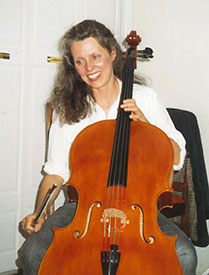
“The most important thing for me when I’m playing is to feel the heart of the music.” — Wanda Warkentin
Wanda graduated in 1974. She played church gigs and casuals, subbed in the Berkeley Symphony and taught private cello lessons. She joined Local 6 and a year later won an audition for the San Jose Symphony where she joined Local 153.
In 1980 Wanda decided to move to New York with her boyfriend. They lived in White Plains, a New York City suburb. Wanda was amazed at how green and lush it was in the summer compared to California. She applied for a teaching job at a nearby school founded by Joyce Barthelson and Virginia Hoff, both of whom played with Margaret Rowell. “I felt like a country bumkin going in. I remember my first day teaching an adult chamber music class, the people in the class sensed my insecurity and said some rude things to test me. It came over me that I had to nip that in the bud. They ended up being a fun group and I worked with them for a few years.”
After breaking up with her boyfriend, Wanda moved to New York City where she taught part time at the school and did word processing to get by. “I had to take an elevator up to my apartment. Coming from California taking an elevator up to your place was strange.”
Wanda eventually formed a group with a violinist at the school, joined Local 802 and began playing in the New York version of the Freeway Philharmonic, which included the New York Opera, Stamford Symphony, and a few gigs at Lincoln Center. After five years she returned to Berkeley. “It was exciting but I really missed my family. It is not like we always get along but when you have a twin you want to be close to each other. So we all moved here.”
Back in the Bay Area Wanda subbed in the San Jose Symphony, joined the Midsummer Mozart Orchestra, and took on private students. When a friend told her that Santa Rosa Symphony was having an audition for principal she took it and won. “I was surprised. That really changed my life, to win that job, because I’ve always tried to keep a low profile. I don’t like people staring at me. I love being anonymous in a pit orchestra. I like being a support. With principal there is a lot of responsibility. You have to put the bowings in the parts, you have to play the solos—orchestra solos in front of huge amounts of people. That was pretty terrifying but I managed to do it.”
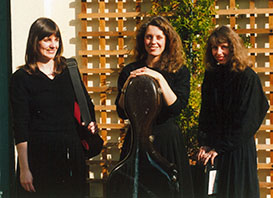
The Warkentin Sisters in the 90s
LENORA
After high school Lenora went to UCLA. She did not intend to be a music major, but immediately gravitated to the music department because she enjoyed it and felt more at home. She studied flute with George Drexler, principal flute for the LA Philharmonic, and was an assistant for many of her professors.
“I loved music and had lots of opportunities to play in orchestras in the area. I joined Local 47 as an undergrad playing with the Cota Symphony, Santa Monica Opera, Beyond Baroque, and some recording sessions. I was really excited about joining. I used to play in the rehearsal band at the Union.”
After graduation Lenora became a professional musician, immersing herself in the competitive LA scene. A year later she went back to school where she spent 3 years getting her masters in flute. Near the end of her studies she was thrilled to be invited to perform a concerto and play principal flute for a season with the National Orchestra of Peru. She wanted to go back but a few months after her return the country had a revolution and it was too dangerous.
Lenora returned to LA, finished her degree, and continued working. A year later she decided to move to the Bay Area. “A few things happened in LA and it kind of soured me on it. My place was broken into and my flute was stolen. I had always been very competitive, and was pretty good at getting work in LA, but I was burned out. I wasn’t doing as much work because if you leave LA and you turn a few people down there’s always someone to jump in. That’s the nature of the flute world. So I came to the Bay Area and took a little time off from playing.”
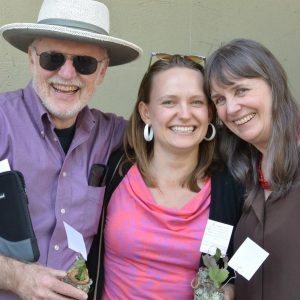
Richard, Alyssa, and Lenora
Lenora waited tables and worked as a manuscript typist in the economics department at UC Berkeley. While waiting tables she met a minister who asked her to play for his church, a Presbyterian Church in Berkeley. “I met a lot of musicians through that and got a lot of exposure playing so I got back into it. I realized how much I loved music and it didn’t matter whether I was on top or not. I loved playing, and being part of a group even more.”
Lenora began doing casuals, trios, pick up orchestras, a lot of churches, and the Oakland Park Band. She transferred her membership to Local 6 and eventually won the audition for the Napa Symphony. She started a trio called Flute and Strings to play weddings and wine country gigs, and would often hire her sisters when they were available.
Lenora met her husband, Richard Mathias, also a Local 6 member, in 1985 while playing in the Oakland Park band. Two years later they had a daughter, Alyssa, who is currently earning her degree in ethnomusicology from UCLA.
Lenora began her teaching career in the early 80s and continues to teach today. She took summer training sessions in Suzuki and Orff teaching methods to broaden her skills and over the years taught at Sacred Heart in San Francisco, Holy Names in the East Bay and Nueva School on the Peninsula. In the 1990s – 2000s she shared a teaching studio with her husband in Oakland. She has found she prefers teaching piano to little kids. “Maybe because I wasn’t as invested in the piano. It’s amazing that when you’re not so picky, the kids make so much more progress. When I first started it would take forever for them to learn the Twinkle Variations. Now I’m freer about it. The kids learn it in the first week and they’re ready to move on.”
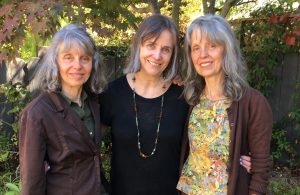
Vivian, Lenora, and Wanda Warkentin, 2016
THE WARKENTINS TODAY
When their father passed, Lenora took a short break from music to wrap up the family business in Southern California. She continues to teach and play, her favorite types of gigs being opera and musical theater. “Performing music has always been an important part of my identity so I always get back to it after life pulls me in another direction. In many ways I am a better musician than I was when I was younger. After time away, I can get back into shape more quickly because the practicing is fresh and I know what is required.”
Vivian continues to play Assistant Concertmaster with the Oakland Symphony, and freelance. She has found ease with her playing, and encourages her students to do the same. “I love practicing now and finding strategies for whatever music I’m trying to learn. Studying jazz has really made me a better musician in so many ways. I feel like I’m always on a quest to improve my musicianship. Jazz has helped me appreciate all music so much more.”
Wanda continues to play as a contracted member of the Santa Rosa and Berkeley Symphonies as well as in other regional and pick-up orchestras. In the late 90s she enjoyed working as the contractor for Midsummer Mozart for a few seasons. Now she is happy playing casuals and sees work picking up. “I feel like I’ve come around to saying I want to be a musician because I love music. When I was younger I didn’t always love it. I felt like a criminal when I didn’t love it. Now I feel much more positive — I enjoy playing incredible repertoire with my wonderful colleagues. I enjoy carpooling, and the friends I make.”
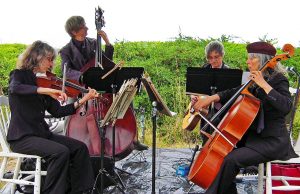
The Warkentin Twins and the McCarthy Twins formed The Jazzling Twintet in the 2000s. From left: Vivian Warkentin, Pat McCarthy, Mike McCarthy, Wanda Warkentin
As a fun side project, the twins formed The Jazzling Twintet with Pat McCarthy and his twin, Mike McCarthy. They have a great time playing jazz and chamber music around the Bay.
Today, the Warkentin Sisters are focused on caring for their mother, who lives with Lenora, and their brother who lives with Vivian and Wanda. Looking back, they are all extremely grateful for the dear friends they have made in the Bay Area music community, and look forward to a future of creative music making.
